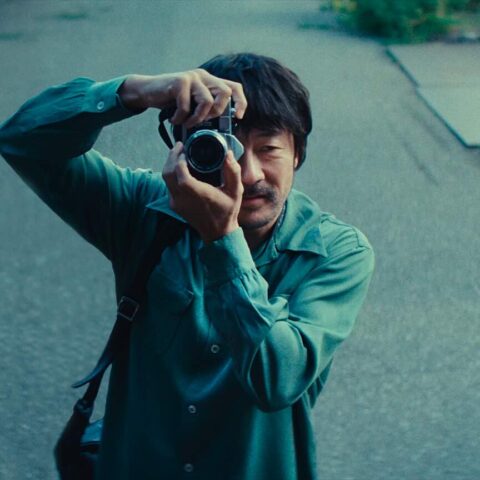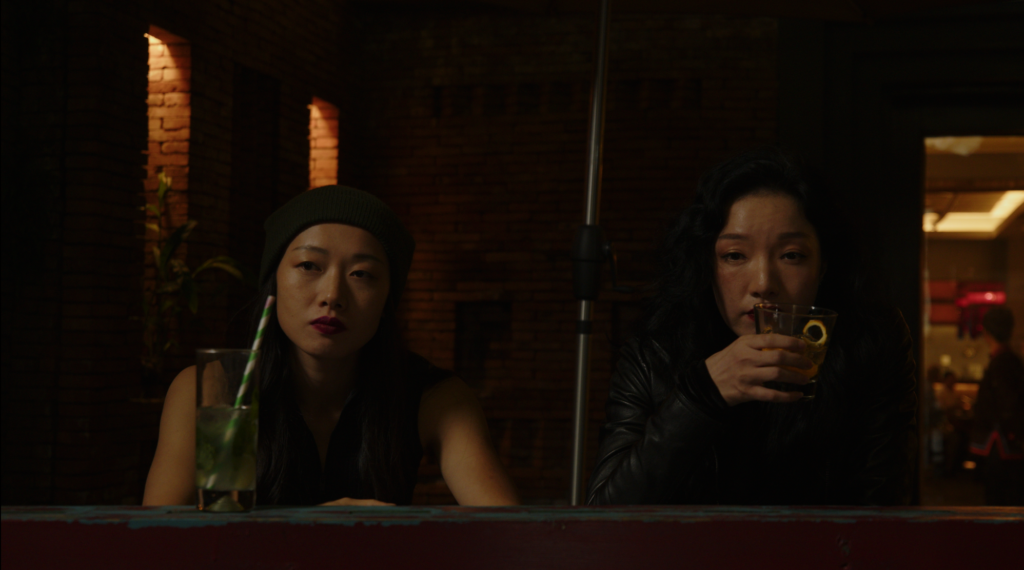
Welcome to our exclusive interview with Sophia Liu, a talented filmmaker, producer, cinematographer, and screenwriter who spends her time between Paris and Shanghai. Sophia’s diverse background in art history, cinema, theatre, and communications has profoundly influenced her artistic vision. With a master’s degree in theatre studies from the University of Paris III Sorbonne Nouvelle, she brings a unique perspective to her craft.
Sophia fearlessly explores gender issues and paradigm shifts in love, infusing her work with a poetic sensibility. Her short films, including “Ne te retourne pas,” “The Listener,” “Absentia,” and her latest, “Touching Moon,” showcase her ability to evoke profound emotions and ask thought-provoking questions.
Beyond her creative pursuits, Sophia is also the founder of SL Studio, a platform that produces international commercials while focusing on cultural and artistic projects. Through her work, she continually seeks to engage with meaningful storytelling and captivate audiences with her unique vision.
In this interview, we delve into Sophia’s experiences studying in Paris, her inspirations as a filmmaker, her life in Shanghai and Paris, struggles with the Covid lockdown in Shanghai, and Sophia’s distinct approach to independent filmmaking.
Can you share any specific experiences or observations from the Covid lockdown in Shanghai that directly influenced certain scenes or elements of the film? How did the extreme living conditions during the lockdown influence your thinking and perspective on life and societies?
The extreme living condition that we have experienced was something unthinkable for people who live in a modern society. When the whole city machine was suddenly shut down, everyone was in a very confused situation without knowing what’s going to happen next. We lived in fear, certainly. I reflected this in the film: “Maybe only when the whole world suddenly suspends, we could have a chance to figure out, what’s important, and what’s not.” The most flagrant point for me, was the total cancellation of social activities overnight. Money lost its value suddenly, we had to exchange with neighbors for specific supplies. “How could I imagine that I used my last egg to exchange for a roll of toilet paper with my neighbor?” This question of Siqi in the film came actually from my personal experience at that time. This made me think, modern societies are functioning in a complex exchanging system. Whether we like it or not we cannot deny the fact that we live in a highly developed commercial society today, and the whole world is connected by this system. People may be unconscious, but if we carefully count the number of transactions we make every day, we’ll certainly be surprised. People need each other, from basic life needs to connecting to the outside world… Societies also need each other, no matter how different they are. Keeping communicating and exchanging with each other in peace is always better than isolationism, confrontations, or vicious competitions. That’s why I wrote in the film: “No one can live alone in the world of today; we all need each other to survive.”
Why did you choose to create the character of Mangyan as an aggregate figure of all women and young queer artists struggling at that time and space? What message or representation did you hope to convey through this character?
Certainly, the past Covid period was extremely difficult for everyone, but it certainly fragilized more who live relatively on the edge of the society: youths, artists, women, queers, elders… Through the character of Menyan, I’d like to convey HOPE for them. Let them foresee the possibilities in their lives and the power in their hands.
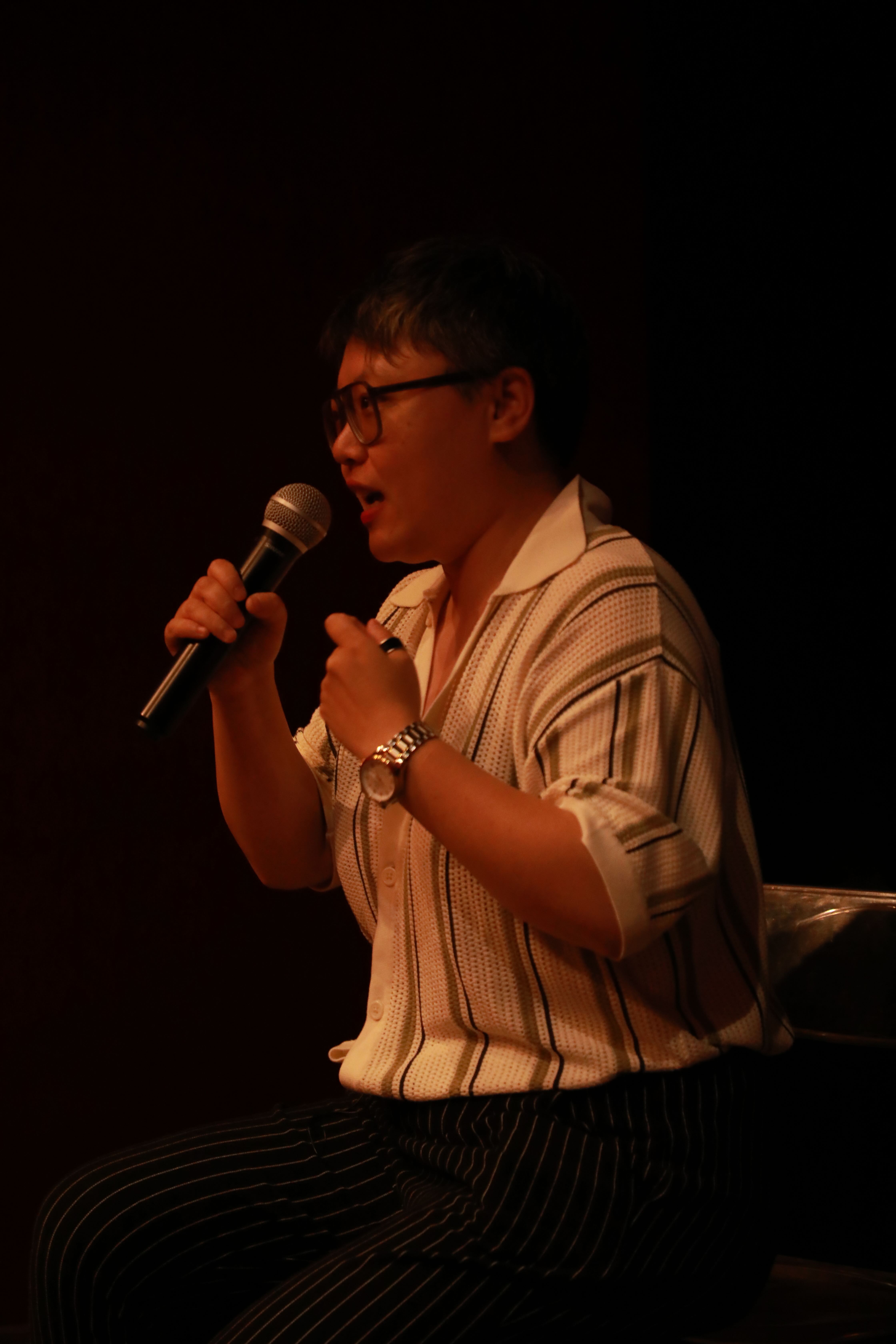
You mentioned that the story is not just about struggles but also about all the choices we need to face in life. Could you elaborate on the choices explored in the film and why they are significant?
Yes. Choices are crucial. They are directions. The character of Mengyan faces many choices in the film, just like you and me, like everyone in real life. Whether stay or leave in an unhappy relationship, whether continue to live at the same place or move to other places, whether live a comfortable life or pursue an artistic career, whether live in others’ judgments or listen to herself…? Those questions lead to life choices. Everyone needs to face to some important questions in their lives and make important choices at a certain point. I think the worst is when people are not even aware of possibilities in their lives, that they have choices, and are able to choose. Even sometimes, it seems almost impossible. I think it’s important to always believe that one has choices, no matter how hopeless the situation seems to be, and always remember to ask oneself if there are better options when facing difficult and delicate situations.
The themes of self-discovery and reaching one’s dreams seem central to the story. How does Mangyan’s journey of self-exploration and the pursuit of her artistic career contribute to the overall narrative?
After our premiere screening in Paris, a young lady from the audience said that she feels the end of the film is only a beginning and she’d love to know what will happen next for the characters. I was a bit surprised but also very pleased to hear such statements. I think she was totally right. The whole film was only a process of self-awakening of Mengyan. The decisions and actions should happen next, out of the film, in audience’ wish fulfillment. That’s why I’d like to say this film is about “dreams”, in the sense of life purposes. The original film title in Chinese “触梦” means exactly “Touching Dreams”. The word “梦 (Meng)” pronounces very similarly with “Moon”, so I chose to use “Touching Moon” as translation. Menyan’s dream stands for everyone’s dreams. From a young woman who wishes to be an artist to a person who considers herself as an artist, there is a big gap to cross. That’s probably the most important thing that Mengyan has accomplished in the film.
In the film, when Mangyan encounters Siqi, she tells Mangyan not to place too much value on other people’s opinions. Can you explain the significance of this encounter and how it relates to the theme of personal freedom?
For me, life was composed with encounters. In different life stage, we met different people. Some of them influence us in significant ways. The character of Siqi is a figure of mature artist and established free woman. She understands that life belongs to oneself, and it is only oneself can define and give meaning to it. Mengyan is actually a younger version of Siqi, young, sincere, passionate with plenty of self-doubts and potentials. For Mengyan, the existence of Siqi is an inspiration. She’d love to be like her, to live as free as she does. Their encounter urges Mengyan to reevaluate her life, to make better choices, and eventually, to gain freedom in life.
Personal freedom is an important subject in life. It’s very easy to forget that we are free beings, that we have absolute rights to decide which kind of lives we want for ourselves, without being judged or influenced by others, especially families and friends. This is a very hard task. I believe that personal freedom is one of the hardest and most valuable life goals. And we have to “fight” in a way or another to get close to it.
How does the film address the concept of love and its role in the characters’ lives? How does it intersect with the broader themes explored in the story?
Love is a big theme, also my “obsession”. It’s omnipresent in my works. I never stop exploring this concept, in life and in my works. I think there is a very delicate connection between “love” and “non-love”. French writer Albert Camus once said : “La gloire, c’est le droit d’aimer sans mesure. (The glory is the right to love without measurements)” I believe that we should learn to use a certain degree of “non-love” or detachment to “love” in a proper and harmonious way.
In the film, Mengyan used to love her boyfriend without measurements, without much consideration for herself, even in abnegation. By the encounter with Siqi, she realized that she should change her way to love. She must love herself first, trust her value and believe in her art. Only by practicing absolute self-love that she could meet authentic love with others. In the last scene of conversation, Mengyan asks Siqi: “Do you love yourself?” Siqi answered: “Of course! I’m not perfect but it’s not a reason not to love myself.” I think this is a powerful statement of self-love. And the deep-rooted self-love is the key towards love, success, independence, and freedom in life.
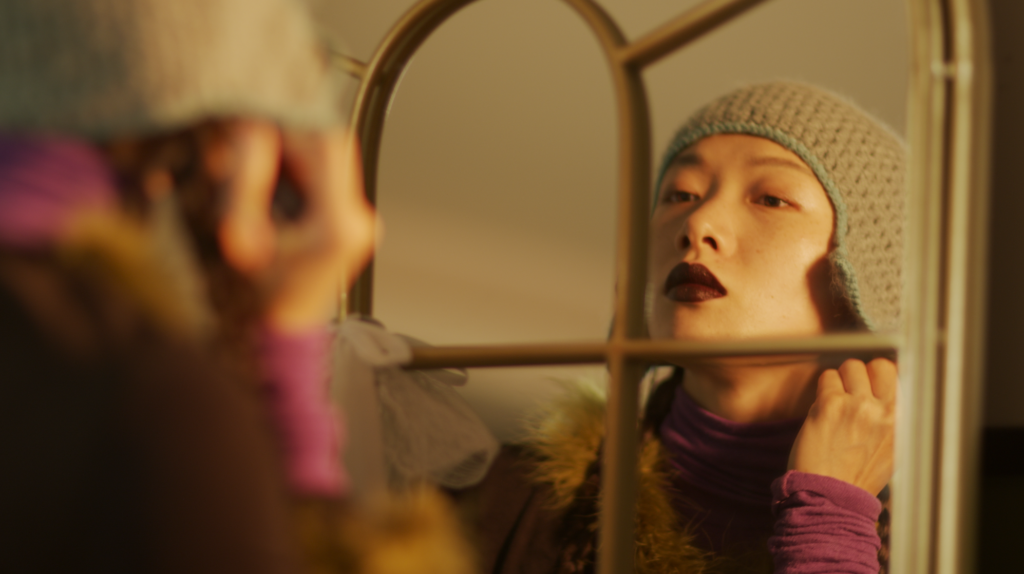
The title “Tranche de Vie” suggests a slice of life. What aspects of everyday life or personal experiences did you aim to capture in the film, and why did you choose this approach?
I like the idea that our universe is like a big bread. Imaging time as a knife, when we cut the bread at a specific moment, we’ll get an ultra-panoramic image. A certain amount of time will compose a certain volume of life, that I’d like to call it “Tranche de vie (slice of life)”. This concept is quite similar with filmmaking. 24 images per second, multiple certain seconds, will get us the impression of a piece of vivid life. That’s why I find cinema fascinating. When we point the camera to the world, we begin to “cut the bread” … I think I’m deeply influenced by the “New Wave Cinema” concept, that my primary motivation of filmmaking was even not storytelling, but painting human conditions, capturing states and movements of life.
As a filmmaker, producer, cinematographer, and screenwriter, you have a diverse range of roles. How do you navigate and balance these different aspects of filmmaking? Are there any particular roles that you find most fulfilling or challenging?
People often tell me that “You can’t do everything by yourself in filmmaking.” And I believe that they are totally right. However, I know many independent filmmakers make their films with multiple roles. Like myself, they truly love cinema and filmmaking, and they are always passionate to learn and master filmmaking skills in every possible aspect. And we often need to face to limited budget and difficult production conditions. I came to the world of cinema from literature and theatre, and I’m very conscious about my creative roots. Once I get those words translated into moving images, I got addicted into the filmmaking process immediately. I think the different aspects of filmmaking are intrinsically and closely connected. Writing, shooting, directing, editing, producing… no matter what I do, the passion of expression behind is the same. I can’t help myself doing and learning everything because I just love it. And I think this is the most interesting part in independent filmmaking. For me, creative freedom is everything. I remember our post sound engineer Mr. Vincent Arnardi once said: “If I chose to work in film industry, is certainly not for fortune or for fame; or not, I should go to real-estate business.” His sentence made me laugh and I feel so grateful to have the chance to work with great professionals like him.
The pursuit of an artistic career is also highlighted as a central aspect of the film. What messages or insights do you hope to convey to aspiring artists through this exploration of pursuing one’s dreams? Are there any personal experiences or beliefs that influenced your portrayal of this theme?
Yes, the pursuit of an artistic career of the protagonist Mengyan is at the core of “Touching Moon”. There are highs and lows in life. It’s easier to believe in art when things are going well. But when situations like the pandemic suddenly occurs, many artists lost their hopes and insights. I remember when the covid firstly strikes in the beginning of 2020, every day seems so long and grey under the first lockdown, I told myself: “This too shall pass”. And today, when this nightmare gets over, it feels like a victory. What doesn’t destroy us only makes us stronger. And it’s very true. Life is full of surprises, if we can always keep our destination in sight even in uncertainties, we can surely drive life to where we’d like to get.
How did you approach the visual aesthetics and cinematography of the film to enhance the storytelling and capture the essence of the narrative? Were there any specific visual choices or techniques employed to convey certain emotions or themes?
Our aesthetic approach for “Touching Moon” aims a simple, elegant, and effective visual style. Same as the film music, I didn’t want the visuals standing out too much, but rather helping us creating characters and telling the story. I like using static shots, especially in the scenes of conversations. The moving shots are present when necessary and most of them are beautifully shot by my talented friend Stanislav Semeniuk. I love very much the walking scene with tracking shots of Mengyan and Siqi zigzagging in the street of old French concession area in the night of Shanghai. When shooting Mengyan alone at home, I often used close-ups to accentuate her mental state. On the poster image, her hand gently suspending in the air becomes the key visual of the film. In the rooftop scene, I used an 85mm prime lens with the aperture wide open, to create a melancholic atmosphere with nice colorful bokeh for the night scene. The dancing movements and singing expressions were put in focus in details, while the environment is blurrily present in a poetic way, hinted but not emphasized. We also used this technique in the end of the first street scene.
What do you hope the audience takes away from watching this film? What emotions, thoughts, or discussions do you aim to evoke?
People often said that my short films are too “intellectual”, and I’m aware of it. Like I said, I’d like to present “une tranche de vie (a piece of life)” and let audience to think, feel, imagine and interpret freely. “There are a thousand Hamlets in a thousand people’s eyes” and we should be happy for that as creators. We present something universally recognizable and got echoes in many’s hearts and minds. Isn’t it enough? Isn’t it a wonderful way to connect with the world as an artist?
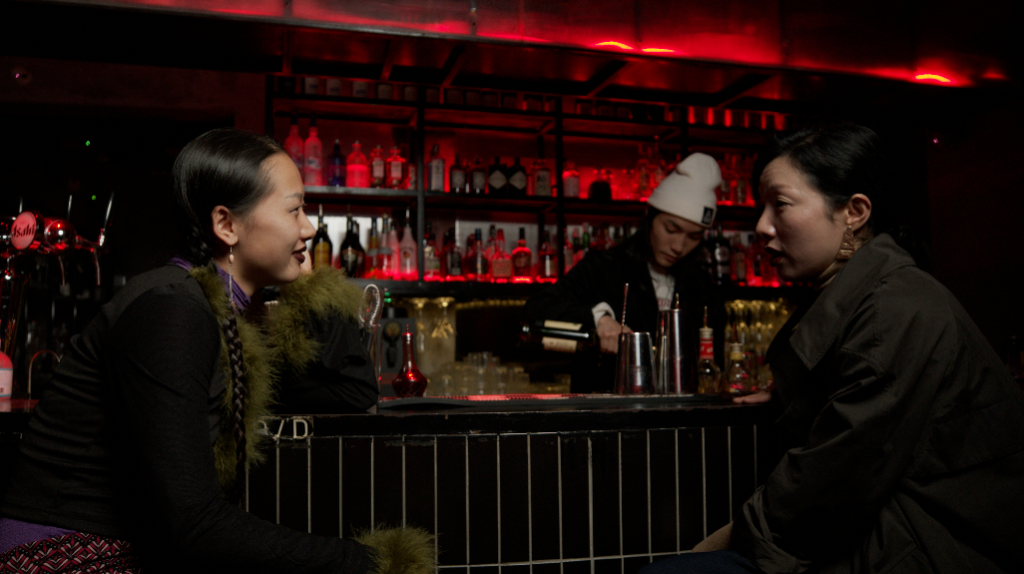
How do you balance your life between Shanghai and Paris? How do these two cities inspire and influence your work differently, if at all?
Living in different cities in the world is one of my childhood dreams. It’s important for me to experience and live in different cultures and social environments. I visited Australia when I was 16. Since then, I never stopped discovering the world. I spent many years studying in Paris, where I learnt to write and to create. After graduation I went back to China and chose Shanghai to settle down. Paris and Shanghai are two important cities in my adult life, they have many similarities and differences that I love with deep attachment. They certainly shaped my life and influenced my work. I can feel free to create in these two cities, but in different ways. For me, Paris is like an intemporal Muse that nurtures and inspires, while Shanghai is more like a modern engine that powers creativity with fuels and facilities. They are both necessary. Certainly, it’s challenging to balance life and work between two major cities with such geographic distance and cultural differences, but I feel very exciting to live this way. It enforces my creativity tremendously and I’m very grateful that I have the chance to live and create freely between Shanghai and Paris.
